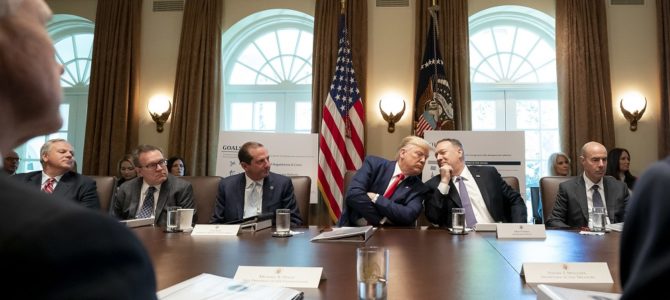
Jacob Heilbrunn wrote a provocative new essay in which he claimed that neoconservatism, “the discredited foreign policy of the last two decades,” has somehow managed to crawl back in the least likely of all places: a Donald Trump presidency.
Heilbrunn, the editor of The National Interest, is no ordinary political commentator. He has written a book on the rise of neoconservatism, from its origins in Marxist-Trotskyist internationalism of the 1930s, to disillusioned defection, to a Wilsonian liberal-internationalism in the 1960s, to the George W. Bush administration’s ill-fated attempt at re-shaping the culture of the most semi-feudal region on the planet, to the Never-Trump movement. Notice how the internationalism didn’t change, even when the ideology morphed.
Heilbrunn cites veteran neocon Mike Ledeen from the Bush era, “Creative destruction is our middle name. … We tear down the old order every day.” Nothing about that was “conservative,” but a radical restructuring. One can argue that included tearing down the old order at home.
Naturally, some of the strongest opponents of a non-interventionist and paleo-conservative right, and the rise of the Trump phenomenon, were the neoconservatives, from Bill Kristol to Max Boot to The Bulwark. In fact, some, like Peter Hitchens, have argued that a few neoconservatives (like his brother Christopher) never really gave up on their internal Trotskyism and internationalism, but hijacked actual conservatism from within.
They conceived of American military power as a means to borderless global equality and the spread of democracy, even at the cost of American blood and treasure and eventual decline. While they might not be Trotskyists in economics, they share the same flattening instinct to make the world homogenous and socially egalitarian. (It is no irony that Christopher’s deathbed wish was the downfall of capitalism.)
Heilbrunn claimed, however, that those differences between a Trump presidency and neoconservatism are a thing of the past. Heilbrunn writes that “in the blinding flash of one drone strike, neoconservatism was easily able to reinsert itself in the national conversation,” which has disillusioned right-wing anti-interventionists behind the rise of Trump, as the “neocon military-intellectual complex is very much still intact, with the ability to spring back to life from a state of suspended animation in an instant.”
Heilbrunn adds that “hawkish tendencies remain widely prevalent not only in the Republican Party but also in the media, the think-tank universe, and in the liberal-hawk precincts of the Democratic Party.” In short, regardless of who’s in charge, the ideology is back, and Trump is helpless before it. Why so?
Partly because the institutions were manned by neocons. According to Heilbrunn, think tanks like Foundation for Defense of Democracy were instrumental in pushing for a regime change in Iran, and are rejoicing at this renewed chance of hostility. That, added with Bush-era brains like Mike Doran, Paul Wolfowitz, and Jonathan S. Tobin, alongside new additions like Tom Cotton and Liz Cheney, meant that everything old is new again.
Is it, though? On the face of it, this is a provocative thesis. But I have a couple of quibbles, simply because these are global phenomena, and a matter of interest for any international relations theorist or political analyst.
First, the idea that internationalists can just simply “hijack” any administration and carry on with globalist policies ignores the power of structural changes. The rise of nationalist and conservative realism and retrenchment isn’t just an American issue, but is observable in Britain, Brazil, India, and Australia, to say the least.
As is the historical norm, the rise of nationalism leads to a more restrained foreign policy. When interests are defined broadly and in globalist terms, when you have ample cash saved and feel powerful in a unipolar world, everything looks like a battle worthy of a fight. Any dead baby pic, in any newspaper in any corner of the world, would be a cause to rally forth.
The Victorians were sort of similar in nature, with their civilizational burden, so to speak. In reality, however, this attitude leads to wasting blood and treasure, until public opinion shifts, which leads to political leaders who cannot go to random wars.
Something similar is happening in the United States. President Trump might not have any idea of how day to day foreign policy works, and it might be easy to trick him into a corner where he faces a war. It is a risk, and Heilbrunn is correct in his assessment that there are quite a few ideologues who would like to take the opportunity of domestic flux to lead the United States to another regime change.
But is that possible? After all, Trump understands public opinion. Twice he backed off from an Iran conflict, and once he was rhetorically harsh about Venezuela without doing anything, despite the presence of Elliot Abrams and John Bolton in the administration.
And what does public opinion say? Consider the latest poll by YouGov and the Charles Koch Institute (CKI). Sixty-eight and 69 percent of Americans want the troops back from Iraq and Afghanistan, respectively. Overall, 52 percent of Americans want less military engagement abroad, and 60 percent of Americans oppose getting involved in any war with Iran. The public simply doesn’t consider the Middle East an important place to be involved anymore (the full poll results are striking.)
Consider the fact that Trump is polling at an all-time high in Wisconsin, the same place where 54 percent of registered voters consider the current Iran strategy wrong. That is in line with the majority of Americans, with 94 percent of Democrats and 52 percent of Republicans concerned about the Middle East. I asked Will Ruger, a CKI vice president, why this should be a factor for Trump’s re-election.
“The Middle East isn’t just a quagmire for American troops,” Ruger said, “It is a trap that could snare the president as well given that the American public is clearly uninterested in more military engagement in the Middle East and elsewhere. People are just tired of two decades of war. Trump would be wise to fulfill his commitment to end our endless wars in Afghanistan and Iraq. This poll and others show that he’ll have the public’s support. It certainly wouldn’t hurt him to be on the side of nearly 70 percent of Americans.”
In short, if Trump is genuinely politically astute, and has people who can read public opinion, nothing is a bigger concern for him than not to end up in another conflict, willingly or mistakenly. The structural incentives are a powerful check. After all, who wouldn’t want to be the first president in more than 30 years to have not started a meaningless new war, and ruled over a period of economic prosperity and peace?
Second, even among those who advocate restraint, there’s a tendency to look at every single missile strike, drone strike, or naval exercise as evidence of neoconservatism or militarism. It is utopian to expect complete pacifism suddenly on all fronts simultaneously. It is just not possible.
Therefore, one simply needs to differentiate between a neoconservative, who wants to reshape the world, with a hawk or an unilateralist, who, while hawkish, who wouldn’t want troops to be bogged down in endless wars. As Damon Linker said, neocons want to use American military might to spread democracy and intervene to help build a new world order. Yet Mike Pompeo, for example, is not interested in all that.
Nor was Jeane Kirkpatrick, or even Ronald Reagan, both of whom were much more realist, prudent, and cognizant of global politics than their soaring rhetoric would suggest. All in all, one of the reasons Trump won is because the counterfactual scenario of either Marco Rubio or Hillary Clinton would have meant a return to the early-00s foreign policy. So far, there’s no evidence of either Trump, or the broader American populace, preferring that scenario.
Reality is complex, and while the chance of stumbling into a stupid war remains a statistical possibility, so far it seems like the gamble of smoking out Qassem Soleimani worked. In a Trumpian version of Madman Theory, the most extreme measure was predicated with back-channel talks of détente via Swiss intermediaries. Iran, wary of a full-scale war with America, got and took the hint.
There may be neoconservatives cheering that drone strike, as neoconservatives are wont to do, but it is unlikely that they are the ones driving policy. That said, Trump and his foreign policy hands should be prudent enough to know which way the wind blows, including within his own base.









